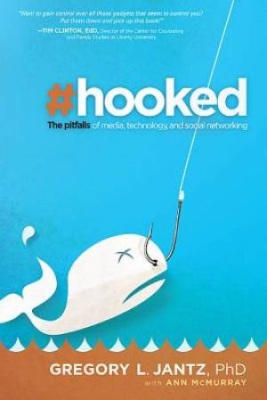Combat Tech Addiction Without Going Cold Turkey

Your smartphone, notebook, tablet, e-reader, iPod -- are all gone. What would you do if all your devices mysteriously went missing and you had no way to jack in to social media or the outside world?
Some of you -- and you know who you are -- would experience symptoms of physical withdrawal, just like any other junkie, according to Dr. Gregory L. Jantz, PhD. It's easy to get caught up in the more endearing and addictive parts of the Web, including Facebook and Twitter. But Jantz says there's a thin line between healthy use and abuse.
As a mental health expert who also deals with drug and alcohol addiction as well as eating disorders, Jantz recognizes this increasing level of addiction among Americans and offers a way to help yourself. The founder of The Center for Counseling and Health Resources' latest book," #Hooked," hopes to show readers how to strike a balance between controlling technology and letting technology control you.
His theory indicates that if you can abstain from something, you can control it. And through his eight-step plan you too can perform a tech detox that includes giving yourself a digital break, sticking to your rules and determining consequences of breaking goals. For more extreme cases, cutting tech out of your life cold turkey is the only option.
We hope the staff here at LAPTOP hasn't gone that far. And besides, hours of laptop and tablet testing followed by hours of networking and gaming don't mean we have a problem, right? Of course, we were a bit skeptical about Dr. Jantz's theory. So we sat down to see if there really is a method behind the madness.
LAPTOP Magazine: What made you want to write this book? Are you a tech addict?
Dr. Gregory L. Jantz: The inspiration to write "#Hooked" came on the heels of discovering that my own family had 18 separate devices for connecting online. Well, that coupled with the evening my boys were texting at the dinner table -- not to friends, but to each other!
Stay in the know with Laptop Mag
Get our in-depth reviews, helpful tips, great deals, and the biggest news stories delivered to your inbox.
LAPTOP: Have you seen a rise in people coming in for treatment for social networking or tech addiction?
Dr. Jantz: At the Center for Counseling and Health Resources, we are seeing an increasing number of people coming in with Internet addiction. The first thing we do is lock their devices in a safe. And what we've found is that patients' withdrawal is often very similar to those kicking an alcohol or substance abuse problem -- anxiety, of course, but also physical symptoms, like trembling, sweating and trouble breathing.

LAPTOP: Do you consider social networking a drug?
Dr. Jantz: Social networking can become just as much of an addictive behavior as drinking or gambling, for example. Bottom line, addiction is behavior that controls you.
LAPTOP: How do you know someone is a tech addict? What are the symptoms?
Dr. Jantz: You may have an Internet addiction if you need to get online to feel like yourself; to feel better; to feel in control. You do it often, and with increasing frequency. It disrupts other aspects of your life, including relationships. But the very thought of not getting online produces feelings of anxiety and discomfort. You may say you're going to change your Internet habits, but inevitably you fall right back into patterns you know to be unhealthy. Your impulses, pleasures, anxieties, fears and preferences take center stage over your better judgment or reasoned decisions.
LAPTOP: If someone is addicted, how would you suggest people deal with job searches and other parts of life where tech is an integral part?
Dr. Jantz: In today's culture, it is unrealistic to create an environment in which we eliminate tech entirely. The key is setting boundaries, learning to recognize the difference between "needing" to get online to fill some personal void as opposed to its true necessity as a tool for taking care of practical matters. I suggest people go through the tech detox outlined in "#Hooked," which should help set the stage for its healthy, helpful use for things like job searches and work-related tasks.
LAPTOP: Are there places you can go for treatment other than doing it yourself?
Dr. Jantz: As Internet addiction becomes increasingly prevalent, treatment facilities will increasingly address it in their programs. For instance, we already have a comprehensive "whole-person" plan in place at The Center for Counseling and Health Resources. In most cases, this level of treatment may not be necessary, as other types of interventions may be sufficiently helpful, whether it's talking to a therapist, following the tech detox in "#Hooked," or a combination of both.
LAPTOP: How do you suggest successfully balancing controlling your own world and tech controlling your world without sporadically detaching yourself entirely? It seems like an extreme option.
Dr. Jantz: Except in extreme cases, I do not recommend trying to disconnect entirely. It does nothing more than set you up for failure, as you will inevitably give in and connect again at some point. The key is building up a series of successes. This means starting out slowly, weaning yourself off here and there, while consciously replacing the activity with something new. For instance, if you normally check Facebook five times a day, limit yourself to three times a day, perhaps morning, noon and night. The other couple of times throughout the day when you are tempted to log on, do something else that you consider fun and/or social -- like playing with the dog or calling a friend.
LAPTOP: In a time where people rely on social media and the Web to get their news and hear about what’s going on around them, is it realistic to detach and isolate yourself, even for a small period of time? What if when you weren’t plugged in you missed important news about a natural disaster? Or what if you got in a car accident and hadn’t brought your cell phone?
Dr. Jantz: When it comes to detaching ourselves from social media, and the Internet in general, everything is relative. Most people who have this addiction are compelled to log on multiple times a day, or to at least have some device with them for the purpose of connecting at all times, most often cell phones. The underlying motivation is fear -- fear that being out of touch is going to have some sort of negative consequence. Certainly, this could mean missing news of a natural disaster, or not having a cell phone at the ready in a car accident, but in the grand scheme of things, what's going to hurt tech/Internet addicts the most is the chronic daily every-living-moment anxiety associated with the need to be connected. Certainly, it is ideal to have a cell phone with us at all times, if only for emergency situations. But there is a balance to strike, and a deliberate tech detox can help.
